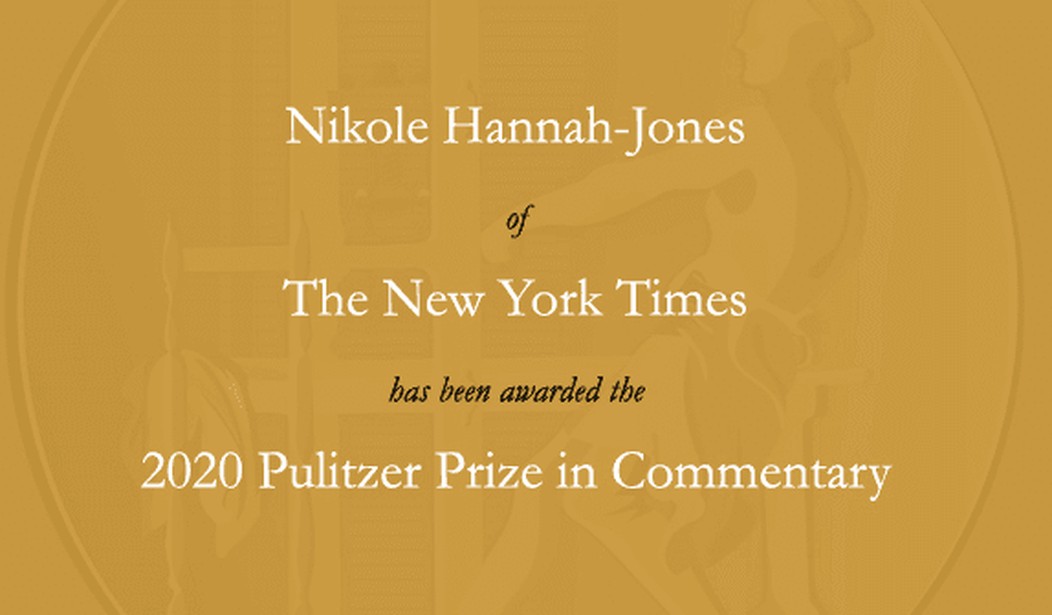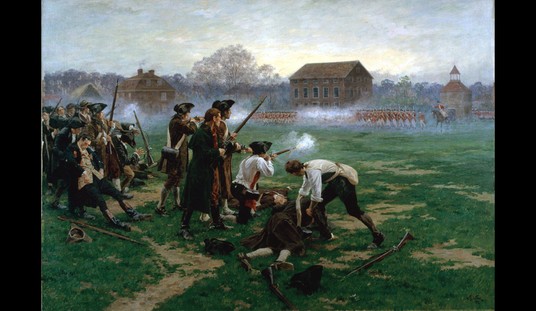
Credit: Twitter/Pulitzer Prizes
As our news media works to make itself invalid, the biggest Fake News of 2019 has now been validated.
It has been lost on many these days, as we are home dealing with the challenges of the pandemic. Not the malpractice in the media; that cannot be overlooked when members of the press daily display retrograde ethical behavior in front of the camera or in print. Many of us have moved on from the biggest journalism implosion of last year; however, the Pulitzer Committee today refreshed our memories by awarding Nikole Hannah-Jones its top prize in Commentary.
Congratulations to @nhannahjones of @nytimes. #Pulitzer pic.twitter.com/ToOmaB8ZI8
— The Pulitzer Prizes (@PulitzerPrizes) May 4, 2020
The New York Times Magazine, to much-advanced fanfare, recognized the 400th anniversary of the official start of slavery in this country when it launched what it called ‘’The 1619 Project’’. In spite of all of the usual self-congratulatory hype we are used to seeing from The Times, the release was very swiftly met with resistance, then more swiftly disavowed by historians. The early claim that conservatives were the ones grousing over the “Project” was quickly buried under the wave of critical historians from across political lines.
Instead of becoming a revolutionary treatise on our country that was widely discussed and accepted, it very quickly was forgotten. While the paper put out a tepid defense of its work, it likely was not overly interested on that front. The main intention was for The 1619 Project to be entered into school curricula across the country, and that has been a moderate success. Some have estimated it is now found in over 3,500 schools.
“The 1619 Project” was fully intended to be a completely new way of looking into our well-established history as a nation. The statement on the website declared it was fully intended in its mission by saying, “It aims to reframe this country’s history.’’ Hannah-Jones herself met criticism by saying, in Orwellian fashion, “The 1619 Project explicitly denies objectivity.” It says everything that this enterprise about our national past was not written with guidance by historians. The authors were of the contemporary racial-grievance social activist bent.
When the writing was nominated for the Pulitzer Prize it was met with equal measures of surprise and inevitability. Most proper-thinking people wondered how a severely discredited piece of work like this could possibly be celebrated by the preeminent journalism award. But those who have been hewed to cynicism by the activities of the contemporary media are not shocked this work could swing from being seen as laughable to be laudable.
It was woven into the DNA of “The 1619 Project.” Upon its release, Hannah-Jones was praising numerous people and organizations who contributed to their effort to make the work available as a curriculum.
These amazing people/organizations believed in the #1619 project and donated to make sure that we could print extra copies and give them to schools, museums, churches and other community groups: @wilsonchandler @EkpeUdoh @itsgabrielleu @johnlegend @NAACP_LDF @Fund2F
— Ida Bae Wells (@nhannahjones) August 19, 2019
Also, there was another reason there was little surprise the Pulitzer would be taking the time to applaud this commentary. They had been involved with its development. It would be difficult for them to turn away from something the outfit had been invested in prior to publication. This left the Pulitzer Center in a catch-22 scenario: Would it risk its reputation by silently acknowledging the project it was involved in was suspect, or would it move forward and award a published work that is widely regarded as anything from “flawed” to “ridiculous”?
This is the state of our media. Not only are severe flaws in reporting barely noted by the supplying outlets — the New York Times has become proficient at the stealth-edit, for instance — but we are in an era where work that in the past would have had an ombudsman working overtime is now not only excused away but is rewarded. We recently saw CNN become a recipient of a major electronic journalism honor for its town hall held after the Parkland High School shooting, long after it had been dismissed as little more than a PR stunt for gun control advocates.
Since we are in The Aluminum Age of journalism, where embarrassingly poor work is the norm, it stands to reason the highest journalism award should also fall to the same levels. When modern journalism became considered a joke it was only a matter of time before the Pulitzer Prize would become the punch line.















Join the conversation as a VIP Member